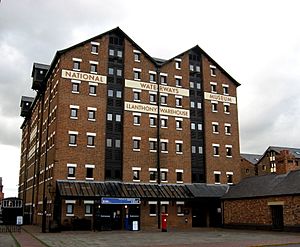Gloucester Waterways Museum facts for kids
 |
|
| Lua error in Module:Location_map at line 420: attempt to index field 'wikibase' (a nil value). | |
| Former name | National Waterways Museum, Gloucester |
|---|---|
| Established | 1988 |
| Location | Gloucester Docks |
| Type | Maritime |
| Architect | Capel N Tripp |
| Owner | Canal and River Trust |
|
Listed Building – Grade II
|
|
| Official name | Llanthony Warehouse |
| Designated | 14 December 1971 |
| Reference no. | 1245607 |
The Gloucester Waterways Museum is a cool place to learn about canals and rivers. It's located in a really old building called a Victorian warehouse. This warehouse is right by the Gloucester Docks in the city of Gloucester, England.
The museum sits next to the Gloucester and Sharpness Canal and the River Severn. Before 2010, it was known as the National Waterways Museum at Gloucester. It is now managed by the Canal & River Trust. This organization looks after many waterways and attractions in Britain.
Contents
History of the Museum
The Gloucester Waterways Museum first opened its doors in 1988. It was originally part of a group of three museums. These museums were run by The Waterways Trust. Their main goal was to show the history of canals in Britain.
Changes and New Focus
Between 2007 and 2008, the museum got a big makeover. New areas were added for visitors to explore. In the summer of 2010, the museum changed its name. It became the Gloucester Waterways Museum. This new name helped the museum focus more on the local area. It also allowed them to get different types of funding.
What You Can See at the Museum
The museum has a fantastic collection of boats. You can see different types of boats that used to travel on canals and rivers. These include long, thin boats called narrowboats. There are also larger river barges and powerful canal and river tugs. One special boat is a steam-powered dredger. This machine was used to clear mud from the waterways.
The museum also shows what a canal repair yard looked like. You can see a steam crane and a heavy oil engine. There's a working machine shop where parts were made. You can also see a forge where metal was shaped. A weighbridge was used to measure heavy loads. There's even a hydraulic accumulator, which stored power.
The museum uses fun, interactive displays. You can try out hands-on exhibits. One popular exhibit is a model of a canal section. It even has working locks that you can operate!
The Museum Building
The Gloucester Waterways Museum is inside a building called Llanthony Warehouse. This warehouse was built in 1873. It was designed by an architect named Capel N Tripp. The building was made for local merchants, Wait, James & Co. They used it to store goods like timber, grain, and alcohol.
Design and Features
Llanthony Warehouse is a tall building with six floors. It is made of red brick. It has a slate roof. The windows have stone lintels and sills. These are the stone pieces above and below the windows.
On December 14, 1971, the building was given a special status. It became a Grade II listed building. This means it's an important historical building. In 1987, the warehouse was changed. It became the National Waterways Museum.
 | Isaac Myers |
 | D. Hamilton Jackson |
 | A. Philip Randolph |

